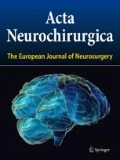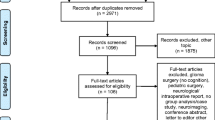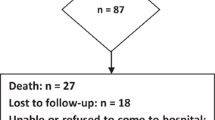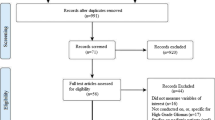Abstract
Background
Many high-grade glioma (HGG) patients have cognitive impairments, which impact daily functioning. Cognitive impairments can be caused by tumour-, treatment-, and patient-related factors. The effect of the tumour and of surgical resection on cognition is, however, not well known. We investigated tumour and surgical effects on cognitive functioning in patients with HGG.
Methods
At baseline, preceding surgery, 62 patients with HGG underwent neuropsychological testing concerning seven cognitive domains: verbal and working memory, attention, executive functioning, psychomotor function, information processing speed, and visuoconstructive abilities. Thirty-nine patients were included in follow-up testing after surgery, but before subsequent treatment. Tumour size and site, use of anti-epileptic drugs and corticosteroids, and extent of resection were recorded.
Results
Compared to healthy controls, cognitive functioning of patients was significantly impaired in all domains. Prior to surgery 79 % (49 of 62) of patients had cognitive impairment in at least one domain. At median follow-up of 5 weeks after surgery, 59 % (23 of 39) of patients were cognitively impaired in at least one domain. At follow-up, 49 % showed improvement, while 23 % declined. Left hemisphere tumour localization was associated with worse verbal memory (P=0.004), and larger tumours in this hemisphere with poorer executive functioning (P < 0.001). Changes in cognitive performance at follow-up relative to baseline were not related to tumour characteristics or extent of resection.
Conclusions
Tumour-related cognitive deficits are present in a majority of HGG patients preceding surgery. Surgery does not result in cognitive deterioration in the short term in most patients.



Similar content being viewed by others
References
Bosma I, Vos MJ, Heimans JJ, Taphoorn MJ, Aaronson NK, Postma TJ, van der Ploeg HM, Muller M, Vandertop WP, Slotman BJ, Klein M (2007) The course of neurocognitive functioning in high–grade glioma patients. Neuro Oncol 9(1):53–62
Brown ES, Chandler PA (2001) Mood and Cognitive Changes During Systemic Corticosteroid Therapy. Prim Care Community Psychiatry 3(1):17–21
De Bie SE (1987) [Proposal for uniformisation of questions regarding background variables and interviews]. Leiden University Press, Leiden
De Groot M, Douw L, Sizoo EM, Bosma I, Froklage FE, Heimans JJ, Postma TJ, Klein M, Reijneveld JC (2013) Levetiracetam improves verbal memory in high–grade glioma patients. Neuro oncol 15(2):216–223
Douw L, Klein M, Fagel SS, van den Heuvel J, Taphoorn MJ, Aaronson NK, Postma TJ, Vandertop WP, Mooij JJ, Boerman RH, Beute GN, Sluimer JD, Slotman BJ, Reijneveld JC, Heimans JJ (2009) Cognitive and radiological effects of radiotherapy in patients with low–grade glioma: long–term follow–up. Lancet Neurol 8(9):810–818
Duffau H, Capelle L, Denvil D, Sichez N, Gatignol P, Lopes M, Mitchell MC, Sichez JP, Van ER (2003) Functional recovery after surgical resection of low grade gliomas in eloquent brain: hypothesis of brain compensation. J Neurol Neurosurg Psychiatry 74(7):901–907
Fastenau PS, Denburg NL, Hufford BJ (1999) Adult norms for the Rey–Osterrieth Complex Figure Test and for supplemental recognition and matching trials from the Extended Complex Figure Test. Clin Neuropsychol 13(1):30–47
Hahn CA, Dunn RH, Logue PE, King JH, Edwards CL, Halperin EC (2003) Prospective study of neuropsychologic testing and quality–of–life assessment of adults with primary malignant brain tumors. Int J Radiat Oncol Biol Phys 55(4):992–999
Hilverda K, Bosma I, Heimans JJ, Postma TJ, Peter VW, Slotman BJ, Buter J, Reijneveld JC, Klein M (2010) Cognitive functioning in glioblastoma patients during radiotherapy and temozolomide treatment: initial findings. J Neurooncol 97(1):89–94
Hom J, Reitan RM (1984) Neuropsychological correlates of rapidly vs. slowly growing intrinsic cerebral neoplasms. J Clin Neuropsychol 6(3):309–324
Jolles J, Van Boxtel MP, Ponds RW, Metsemakers JF, Houx PJ (1998) The Maastricht aging study (MAAS). The longitudinal perspective of cognitive aging. Tijdschr Gerontol Geriatr 29(3):120–129
Kaleita TA, Wellisch DK, Cloughesy TF, Ford JM, Freeman D, Belin TR, Goldman J (2004) Prediction of neurocognitive outcome in adult brain tumor patients. J Neurooncol 67(1–2):245–253
Kayl AE, Meyers CA (2003) Does brain tumor histology influence cognitive function? Neuro Oncol 5(4):255–260
Klein M, De Witt Hamer PC (2011) Neurocognitive outcome and resective brain tumor surgery in adults. In: Duffau H (ed) Brain mapping: from neural basis of cognition to surgical applications. Springer, Vienna, pp 193–206
Klein M, Duffau H, De Witt Hamer PC (2012) Cognition and resective surgery for diffuse infiltrative glioma: an overview. J Neurooncol 108(2):309–318
Klein M, Engelberts NH, van der Ploeg HM, Kasteleijn–Nolst Trenite DG, Aaronson NK, Taphoorn MJ, Baaijen H, Vandertop WP, Muller M, Postma TJ, Heimans JJ (2003) Epilepsy in low–grade gliomas: the impact on cognitive function and quality of life. Ann Neurol 54(4):514–520
Klein M, Taphoorn MJ, Heimans JJ, van der Ploeg HM, Vandertop WP, Smit EF, Leenstra S, Tulleken CA, Boogerd W, Belderbos JS, Cleijne W, Aaronson NK (2001) Neurobehavioral status and health–related quality of life in newly diagnosed high–grade glioma patients. J Clin Oncol 19(20):4037–4047
Lezak MD, Howieson DB, Loring DW (2004) Neuropsychological Assessment. Oxford Univerity Press, New York
Meyers CA, Cantor SB (2003) Neuropsychological assessment and treatment of patients with malignant brain tumors. In: Prigatano GP, Pliskin NH (eds) Clinical neuropsychology and cost outcome research, a beginning. Psychology Press, Inc., New York, pp 159–173
Osterreith PA (1944) Le test de copie d'une figure complexe [A test regarding a complex figure]. Archives de Psychologie/The Clinical Neuropsychologist 30/7:206–9–356/15
Pringle AM, Taylor R, Whittle IR (1999) Anxiety and depression in patients with an intracranial neoplasm before and after tumour surgery. Br J Neurosurg 13(1):46–51
Sanai N, Mirzadeh Z, Berger MS (2008) Functional outcome after language mapping for glioma resection. N Engl J Med 358(1):18–27
Santini B, Talacchi A, Squintani G, Casagrande F, Capasso R, Miceli G (2012) Cognitive outcome after awake surgery for tumors in language areas. J Neurooncol 108:319–326
Satoer D, Vork J, Visch–Brink E, Smits M, Dirven C, Vincent A (2012) Cognitive functioning early after surgery of gliomas in eloquent areas. J Neurosurg 117(5):831–838
Scheibel RS, Meyers CA, Levin VA (1996) Cognitive dysfunction following surgery for intracerebral glioma: influence of histopathology, lesion location, and treatment. J Neurooncol 30(1):61–69
Schmand B, Lindeboom J, Van Harskamp F (1992) [The 15 words test A and B (a preliminary manual)]. Afdeling Neuropyschologie, AZG, Groningen
Stupp R, Hegi ME, Mason WP, van den Bent MJ, Taphoorn MJ, Janzer RC, Ludwin SK, Allgeier A, Fisher B, Belanger K, Hau P, Brandes AA, Gijtenbeek J, Marosi C, Vecht CJ, Mokhtari K, Wesseling P, Villa S, Eisenhauer E, Gorlia T, Weller M, Lacombe D, Cairncross JG, Mirimanoff RO (2009) Effects of radiotherapy with concomitant and adjuvant temozolomide versus radiotherapy alone on survival in glioblastoma in a randomised phase III study: 5–year analysis of the EORTC–NCIC trial. Lancet Oncol 10(5):459–466
Talacchi A, Santini B, Savazzi S, Gerosa M (2011) Cognitive effects of tumour and surgical treatment in glioma patients. J Neurooncol 103(3):541–549
Taphoorn MJ, Klein M (2004) Cognitive deficits in adult patients with brain tumours. Lancet Neurol 3(3):159–168
Tucha O, Smely C, Preier M, Lange KW (2000) Cognitive deficits before treatment among patients with brain tumors. Neurosurgery 47(2):324–333
Van den Bent MJ, Brandes AA, Taphoorn MJ, Kros JM, Kouwenhoven MC, Delattre JY, Bernsen HJ, Frenay M, Tijssen CC, Grisold W, Sipos L, Enting RH, French PJ, Dinjens WN, Vecht CJ, Allgeier A, Lacombe D, Gorlia T, Hoang–Xuan K (2013) Adjuvant procarbazine, lomustine, and vincristine chemotherapy in newly diagnosed anaplastic oligodendroglioma: long–term follow–up of EORTC brain tumor group study 26951. J Clin Oncol 31(3):344–350
Van der Elst W, Van Boxtel MP, Van Breukelen GJ, Jolles J (2006) The Concept Shifting Test: adult normative data. Psychol Assess 18(4):424–432
Wechsler D (2000) Wechsler Adult Intelligence Scale III, [Dutch revision. Technical Manual]. Lisse
Weitzner MA, Meyers CA, Byrne K (1996) Psychosocial functioning and quality of life in patients with primary brain tumors. J Neurosurg 84(1):29–34
Wu AS, Witgert ME, Lang FF, Xiao L, Bekele BN, Meyers CA, Ferson D, Wefel JS (2011) Neurocognitive function before and after surgery for insular gliomas. J Neurosurg 115(6):1115–1125
Yoshii Y, Tominaga D, Sugimoto K, Tsuchida Y, Hyodo A, Yonaha H, Kushi S (2008) Cognitive function of patients with brain tumor in pre–and postoperative stage. Surg Neurol 69(1):51–61
Conflict of interest
None
Ethical standards
This study was considered part of standard patient care, therefore no approval of a medical ethics committee was required. All patients gave informed consent prior to their inclusion in this study.
Funding
St. Jacobusstichting, The Hague, the Netherlands
Author information
Authors and Affiliations
Corresponding author
Rights and permissions
About this article
Cite this article
Habets, E.J.J., Kloet, A., Walchenbach, R. et al. Tumour and surgery effects on cognitive functioning in high-grade glioma patients. Acta Neurochir 156, 1451–1459 (2014). https://doi.org/10.1007/s00701-014-2115-8
Received:
Accepted:
Published:
Issue Date:
DOI: https://doi.org/10.1007/s00701-014-2115-8




